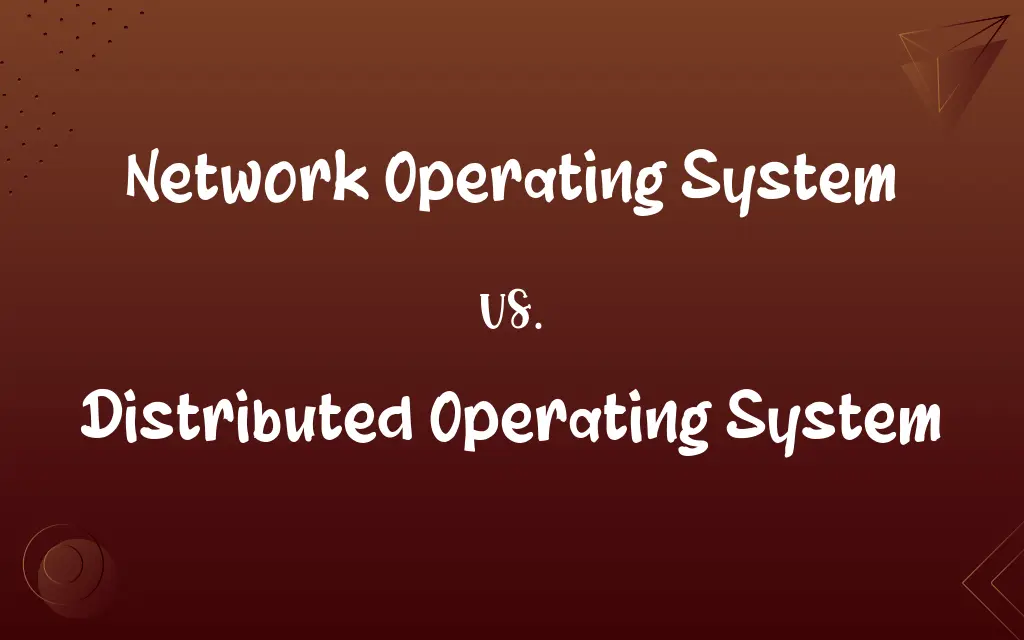Network Operating System vs. Distributed Operating System: Know the Difference

By Shumaila Saeed || Published on February 20, 2024
Network Operating System (NOS) manages network resources, while Distributed Operating System (DOS) manages a collection of independent computers appearing as a single system.

Key Differences
A Network Operating System (NOS) focuses on providing services to computers connected over a network. It enables resource sharing, including files and printers, among multiple computers. In contrast, a Distributed Operating System (DOS) integrates a group of independent computers into a system that appears to its users as a single coherent system. This approach differs in its intrinsic ability to create a unified computing environment from multiple nodes.
Shumaila Saeed
Feb 20, 2024
The Network Operating System is designed for robust network management and security. It facilitates communication, data sharing, and application operations across networked computers. On the other hand, a Distributed Operating System aims to provide a transparent and integrated computing experience across multiple machines. It achieves this by managing and coordinating tasks and resources across the distributed infrastructure as if it were a single system.
Shumaila Saeed
Feb 20, 2024
NOS typically operates in an environment where individual computers have their own user interfaces and operating systems. It enhances network functionality without fundamentally changing how each computer functions. Distributed Operating Systems, conversely, require a more homogenous environment where all participating nodes often run on the same OS, providing a more seamless and integrated user experience.
Shumaila Saeed
Feb 20, 2024
In a Network Operating System, users are aware of the multiplicity of machines. They might have to log into separate systems to access different resources. Conversely, a Distributed Operating System masks the complexity of the underlying network, presenting the entire group of computers as a single unified entity to the user.
Shumaila Saeed
Feb 20, 2024
Network Operating Systems generally offer easier setup and maintenance, suitable for less complex networks. Distributed Operating Systems, while more complex to set up and maintain, offer higher levels of resource utilization, scalability, and fault tolerance, suitable for more demanding and integrated network tasks.
Shumaila Saeed
Feb 20, 2024
ADVERTISEMENT
Comparison Chart
Resource Management
Manages resources across separate computers
Integrates resources across multiple machines
Shumaila Saeed
Feb 20, 2024
User Experience
Users interact with multiple systems
Users interact with a single coherent system
Shumaila Saeed
Feb 20, 2024
System Homogeneity
Diverse systems can coexist
Requires more homogeneous systems
Shumaila Saeed
Feb 20, 2024
Complexity and Maintenance
Generally simpler and easier to maintain
More complex, requiring careful coordination
Shumaila Saeed
Feb 20, 2024
Primary Objective
Enhances network functionality
Provides seamless integration of resources
Shumaila Saeed
Feb 20, 2024
ADVERTISEMENT
Network Operating System and Distributed Operating System Definitions
Network Operating System
NOS facilitates and manages network resources and services like file sharing.
Our company uses a network operating system to streamline data sharing between departments.
Shumaila Saeed
Jan 24, 2024
Distributed Operating System
DOS manages and synchronizes distributed network tasks to appear as a single system to the user.
The research team used a distributed operating system to handle complex simulations across multiple servers.
Shumaila Saeed
Jan 24, 2024
Network Operating System
A system software that provides a platform for networking operations in a computer environment.
The organization's network operating system ensures smooth operation of its internal communication systems.
Shumaila Saeed
Jan 24, 2024
Distributed Operating System
An OS designed to work on a network of interconnected but independent computers.
The distributed operating system enabled the company to utilize the full potential of its computing resources.
Shumaila Saeed
Jan 24, 2024
Network Operating System
NOS is designed to handle network tasks like data storage, security, and user management.
The IT team upgraded the network operating system to enhance network security.
Shumaila Saeed
Jan 24, 2024
ADVERTISEMENT
Distributed Operating System
A software that manages a group of independent computers as a single unified system.
The distributed operating system seamlessly connected all campus computers into one network.
Shumaila Saeed
Jan 24, 2024
Network Operating System
A software that controls other software and hardware running on a network.
The school's network operating system manages access to printers and shared files.
Shumaila Saeed
Jan 24, 2024
Distributed Operating System
A system that provides a single, integrated computing experience over a network of computers.
The university's distributed operating system facilitated collaborative research across different departments.
Shumaila Saeed
Jan 24, 2024
Network Operating System
A program that allows computers in a network to communicate and share resources.
The new network operating system improved the efficiency of our office's computer network.
Shumaila Saeed
Jan 24, 2024
Distributed Operating System
DOS integrates multiple machines to provide a cohesive and efficient computing environment.
With the distributed operating system, processing tasks were efficiently divided across the network.
Shumaila Saeed
Jan 24, 2024
Repeatedly Asked Queries
Can Distributed Operating Systems work with different types of hardware?
Yes, but they work best in an environment with similar or compatible hardware types.
Shumaila Saeed
Feb 20, 2024
What is a Network Operating System?
A software that facilitates networking functions, like file sharing and printer access, among computers.
Shumaila Saeed
Feb 20, 2024
What is a Distributed Operating System?
An OS that coordinates and integrates multiple computers to operate as a single cohesive system.
Shumaila Saeed
Feb 20, 2024
How does a Network Operating System differ from traditional OS?
Unlike traditional OS, NOS focuses on network tasks like managing connections and shared resources.
Shumaila Saeed
Feb 20, 2024
What are the main benefits of a Network Operating System?
Main benefits include simplified resource sharing, network management, and enhanced security.
Shumaila Saeed
Feb 20, 2024
What type of network is ideal for a Network Operating System?
Ideal for both small and large networks needing resource sharing and communication.
Shumaila Saeed
Feb 20, 2024
What are the advantages of using a Distributed Operating System?
Advantages include efficient resource utilization, scalability, and fault tolerance.
Shumaila Saeed
Feb 20, 2024
Is a Distributed Operating System difficult to implement?
It can be complex due to the need for coordination among multiple computers.
Shumaila Saeed
Feb 20, 2024
Can NOS operate independently of the underlying OS on computers?
Yes, NOS operates on top of the underlying OS, managing network-specific tasks.
Shumaila Saeed
Feb 20, 2024
Is Network Operating System suitable for small businesses?
Yes, its ability to manage network resources effectively makes it suitable for small businesses.
Shumaila Saeed
Feb 20, 2024
Can Network Operating Systems be customized?
Yes, they often allow customization to fit specific network requirements.
Shumaila Saeed
Feb 20, 2024
What is the role of synchronization in Distributed Operating Systems?
It ensures that operations across the network are coordinated and consistent.
Shumaila Saeed
Feb 20, 2024
Can NOS support multiple users?
Yes, NOS is designed to support multiple users accessing and sharing network resources.
Shumaila Saeed
Feb 20, 2024
Can a Distributed Operating System be used in cloud computing?
Yes, it's particularly effective in cloud environments for handling distributed resources.
Shumaila Saeed
Feb 20, 2024
How does DOS ensure reliability and fault tolerance?
DOS distributes tasks across computers, so failure in one doesn’t halt the entire system.
Shumaila Saeed
Feb 20, 2024
Does a Distributed Operating System require specialized software?
Yes, it requires specialized software to manage the distributed architecture effectively.
Shumaila Saeed
Feb 20, 2024
What kind of security features does NOS offer?
NOS offers features like user authentication, data encryption, and access control.
Shumaila Saeed
Feb 20, 2024
Does NOS provide internet access?
While not its primary function, NOS can facilitate internet connectivity.
Shumaila Saeed
Feb 20, 2024
Can Distributed Operating Systems be used for real-time applications?
Yes, their ability to process tasks quickly and efficiently makes them suitable for real-time applications.
Shumaila Saeed
Feb 20, 2024
How does DOS handle data processing?
DOS distributes processing tasks across the network for increased efficiency.
Shumaila Saeed
Feb 20, 2024
Share this page
Link for your blog / website
HTML
Link to share via messenger
About Author
Written by
Shumaila SaeedShumaila Saeed, an expert content creator with 6 years of experience, specializes in distilling complex topics into easily digestible comparisons, shining a light on the nuances that both inform and educate readers with clarity and accuracy.









































































